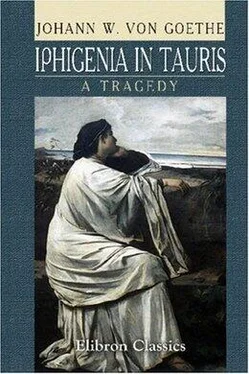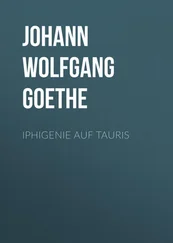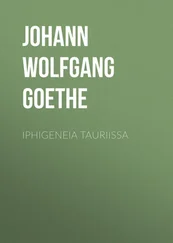Iphigenia in Tauris
A Tragedy
Johann Wolfgang von Goethe
Scene I.
a Grove Before the Temple of Diana
IPHIGENIA.
Beneath your leafy gloom, ye waving boughs
Of this old, shady, consecrated grove,
As in the goddess' silent sanctuary,
With the same shudd'ring feeling forth I step,
As when I trod it first, nor ever here
Doth my unquiet spirit feel at home.
Long as the mighty will, to which I bow,
Hath kept me here conceal'd, still, as at first,
I feel myself a stranger. For the sea
Doth sever me, alas! from those I love,
And day by day upon the shore I stand,
My soul still seeking for the land of Greece.
But to my sighs, the hollow–sounding waves
Bring, save their own hoarse murmurs, no reply.
Alas for him! who friendless and alone,
Remote from parents and from brethren dwells;
From him grief snatches every coming joy
Ere it doth reach his lip. His restless thoughts
Revert for ever to his father's halls,
Where first to him the radiant sun unclos'd
The gates of heav'n; where closer, day by day,
Brothers and sisters, leagu'd in pastime sweet,
Around each other twin'd the bonds of love.
I will not judge the counsel of the gods;
Yet, truly, woman's lot doth merit pity.
Man rules alike at home and in the field,
Nor is in foreign climes without resource;
Possession gladdens him, him conquest crowns,
And him an honourable death awaits.
How circumscrib'd is woman's destiny!
Obedience to a harsh, imperious lord,
Her duty, and her comfort; sad her fate,
Whom hostile fortune drives to lands remote:
Thus I, by noble Thoas, am detain'd,
Bound with a heavy, though a sacred chain.
Oh! with what shame, Diana, I confess
That with repugnance I perform these rites
For thee, divine protectress! unto whom
I would in freedom dedicate my life.
In thee, Diana, I have always hop'd,
And still I hope in thee, who didst infold
Within the holy shelter of thine arm
The outcast daughter of the mighty king.
Daughter of Jove! hast thou from ruin'd Troy
Led back in triumph to his native land
The mighty man, whom thou didst sore afflict,
His daughter's life in sacrifice demanding,—
Hast thou for him, the godlike Agamemnon,
Who to thine altar led his darling child,
Preserv'd his wife, Electra, and his son.
His dearest treasures?—then at length restore
Thy suppliant also to her friends and home,
And save her, as thou once from death didst save,
So now, from living here, a second death.
SCENE II.
IPHIGENIA. ARKAS.
ARKAS.
The king hath sent me hither, and commands
To hail Diana's priestess. This the day,
On which for new and wonderful success,
Tauris her goddess thanks. The king and host
Draw near,—I come to herald their approach.
IPHIGENIA.
We are prepar'd to give them worthy greeting;
Our goddess doth behold with gracious eye
The welcome sacrifice from Thoas' hand.
ARKAS.
Oh, priestess, that thine eye more mildly beam'd,—
Thou much–rever'd one,—that I found thy glance,
O consecrated maid, more calm, more bright,
To all a happy omen! Still doth grief,
With gloom mysterious, shroud thy inner mind;
Still, still, through many a year we wait in vain
For one confiding utt'rance from thy breast.
Long as I've known thee in this holy place,
That look of thine hath ever made me shudder;
And, as with iron bands, thy soul remains
Lock'd in the deep recesses of thy breast.
IPHIGENIA.
As doth become the exile and the orphan.
ARKAS.
Dost thou then here seem exil'd and an orphan?
IPHIGENIA.
Can foreign scenes our fatherland replace?
ARKAS.
Thy fatherland is foreign now to thee.
IPHIGENIA.
Hence is it that my bleeding heart ne'er heals.
In early youth, when first my soul, in love,
Held father, mother, brethren fondly twin'd,
A group of tender germs, in union sweet,
We sprang in beauty from the parent stem,
And heavenward grew. An unrelenting curse
Then seiz'd and sever'd me from those I lov'd,
And wrench'd with iron grasp the beauteous bands.
It vanish'd then, the fairest charm of youth,
The simple gladness of life's early dawn;
Though sav'd, I was a shadow of myself,
And life's fresh joyance bloom'd in me no more.
ARKAS.
If thus thou ever dost lament thy fate,
I must accuse thee of ingratitude.
IPHIGENIA.
ARKAS.
Not the honest thanks
Which prompt the heart to offices of love;
The joyous glance, revealing to the host
A grateful spirit, with its lot content.
When thee a deep mysterious destiny
Brought to this sacred fane, long years ago.
To greet thee, as a treasure sent from heaven,
With reverence and affection, Thoas came.
Benign and friendly was this shore to thee,
Which had before each stranger's heart appall'd,
For, till thy coming, none e'er trod our realm
But fell, according to an ancient rite,
A bloody victim at Diana's shrine.
IPHIGENIA.
Freely to breathe alone is not to live.
Say, is it life, within this holy fane,
Like a poor ghost around its sepulchre
To linger out my days? Or call you that
A life of conscious happiness and joy,
When every hour, dream'd listlessly away,
Leads to those dark and melancholy days,
Which the sad troop of the departed spend
In self–forgetfulness on Lethe's shore?
A useless life is but an early death;
This, woman's lot, is eminently mine.
ARKAS.
I can forgive, though I must needs deplore,
The noble pride which underrates itself
It robs thee of the happiness of life.
And hast thou, since thy coming here, done nought?
Who cheer'd the gloomy temper of the king?
Who hath with gentle eloquence annull'd,
From year to year, the usage of our sires,
By which, a victim at Diana's shrine,
Each stranger perish'd, thus from certain death
Sending so oft the rescued captive home?
Hath not Diana, harbouring no revenge
For this suspension of her bloody rites,
In richest measure heard thy gentle prayer?
On joyous pinions o'er the advancing host,
Doth not triumphant conquest proudly soar?
And feels not every one a happier lot,
Since Thoas, who so long hath guided us
With wisdom and with valour, sway'd by thee,
The joy of mild benignity approves,
Which leads him to relax the rigid claims
Of mute submission? Call thyself useless! Thou,
Thou, from whose being o'er a thousand hearts,
A healing balsam flows? when to a race.
To whom a god consign'd thee, thou dost prove
A fountain of perpetual happiness,
And from this dire inhospitable shore
Dost to the stranger grant a safe return?
IPHIGENIA.
The little done doth vanish to the mind,
Which forward sees how much remains to do.
ARKAS.
Him dost thou praise, who underrates his deeds?
IPHIGENIA.
Who estimates his deeds is justly blam'd.
ARKAS.
We blame alike, who proudly disregard
Their genuine merit, and who vainly prize
Their spurious worth too highly. Trust me, priestess,
And hearken to the counsel of a man
With honest zeal devoted to thy service:
When Thoas comes to–day to speak with thee,
Lend to his purpos'd words a gracious ear.
Читать дальше












